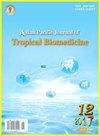Decreased TRPM7 alleviates high glucose-induced renal tubular epithelial cell injury by inhibiting the HMGB1/TLR4 signaling pathway
IF 1.7
4区 医学
Q3 TROPICAL MEDICINE
引用次数: 0
Abstract
Objective: To explore the regulatory mechanism of transient receptor potential melastatin-7 (TRPM7) in high glucose-induced renal tubular epithelial cell injury. Methods: The expression of TRPM7 in the serum of diabetic nephropathy patients and high glucose-induced HK-2 cells was detected by RT-qPCR. Then, the TRPM7 interference vector was constructed, and the downstream high mobility group box 1 (HMGB1)/Toll-like receptor 4 (TLR4) signaling pathway proteins were detected. Next, in addition to interference with TRPM7 expression, overexpression of HMGB1 in high glucose-induced HK-2 cells was performed. Cell activity, apoptosis, oxidative stress levels, and inflammation levels were determined by CCK8, TUNEL, Western blotting, immunofluorescence and related kits. Results: TRPM7 expression was upregulated in the serum of diabetic nephropathy patients and high glucose-induced HK-2 cells. Interference with TRPM7 reduced cell damage, epithelial-mesenchymal transition, oxidative stress, and inflammatory response in high glucose-induced HK-2 cells via inhibiting the HMGB1/TLR4 signaling pathway. However, the effects induced by TRPM7 silencing were abrogated by HMGB1 overexpression. Conclusions: Decreased TRPM7 alleviates high glucose-induced renal tubular epithelial cell injury by inhibiting the HMGB1/TLR4 signaling pathway. Further animal experiments and clinical trials are warranted to verify its effect.降低TRPM7可通过抑制HMGB1/TLR4信号通路减轻高糖诱导的肾小管上皮细胞损伤
目的:探讨瞬时受体电位褪黑素-7 (TRPM7)在高糖诱导的肾小管上皮细胞损伤中的调控机制。方法:采用RT-qPCR方法检测TRPM7在糖尿病肾病患者血清及高糖诱导的HK-2细胞中的表达。然后构建TRPM7干扰载体,检测下游高迁移率组盒1 (HMGB1)/ toll样受体4 (TLR4)信号通路蛋白。接下来,在高糖诱导的HK-2细胞中,除了干扰TRPM7的表达外,还进行了HMGB1的过表达。采用CCK8、TUNEL、Western blotting、免疫荧光及相关试剂盒检测细胞活性、凋亡、氧化应激水平和炎症水平。结果:TRPM7在糖尿病肾病患者血清及高糖诱导的HK-2细胞中表达上调。通过抑制HMGB1/TLR4信号通路,干扰TRPM7可降低高糖诱导的HK-2细胞的细胞损伤、上皮-间质转化、氧化应激和炎症反应。然而,TRPM7沉默诱导的效应被HMGB1过表达所消除。结论:TRPM7降低可通过抑制HMGB1/TLR4信号通路减轻高糖诱导的肾小管上皮细胞损伤。需要进一步的动物实验和临床试验来验证其效果。
本文章由计算机程序翻译,如有差异,请以英文原文为准。
求助全文
约1分钟内获得全文
求助全文
来源期刊

Asian Pacific journal of tropical biomedicine
Biochemistry, Genetics and Molecular Biology-Biochemistry, Genetics and Molecular Biology (miscellaneous)
CiteScore
3.10
自引率
11.80%
发文量
2056
审稿时长
4 weeks
期刊介绍:
The journal will cover technical and clinical studies related to health, ethical and social issues in field of biology, bacteriology, biochemistry, biotechnology, cell biology, environmental biology, microbiology, medical microbiology, pharmacology, physiology, pathology, immunology, virology, toxicology, epidemiology, vaccinology, hematology, histopathology, cytology, genetics and tropical agriculture. Articles with clinical interest and implications will be given preference.
 求助内容:
求助内容: 应助结果提醒方式:
应助结果提醒方式:


